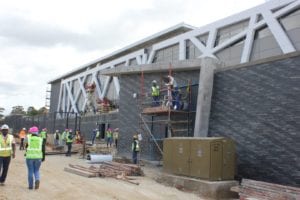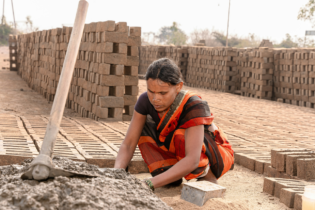
Construction work at the Plettenberg Bay Magistrate’s project
The project, which is being implemented by the Independent Development Trust (IDT) for the Department of Justice, has seen the creation of 519 work opportunities to date and half of these were taken up by people local to the Plettenberg Bay, many of whom were unemployed general and semi-skilled workers.
The Bitou Municipality has connected the new building to the grid and according to the IDT equipment is being commissioned in order for the project to be handed over to reach practical completion by the mid-March 2018.
The Department of Justice contracted the IDT to manage the project worth over R300 million on its behalf, a testament to the IDT’s position as a premier social infrastructure programme delivery management entity for the government.
The 10 courtrooms housed in the building include criminal courts, sexual offences courts, regional courts and civil courts.
Comprehensive social facilitation process
At the outset of the project the IDT embarked on a comprehensive social facilitation process – a niche for the IDT which ensures that communities take ownership of the facilities once transferred to them – which included participation and buy-in from the Bitou Municipal Council.
Intensive community engagements and community meetings were held in all wards where the community was informed of the project and an undertaking that work opportunities and sub- contracting opportunities were going to be available on this project.
A steering committee representative of all the wards was set up, a community liaison officer appointed, and the task of ensuring that the community of Bitou gets maximum social and economic benefits from this development remains the common bond that drives the committee as it is purely on a voluntary basis.
Furthermore, the IDT – in consultation with the appointed contractor – facilitated a process where prospects for sub-contractors not contracted via the tender process were given an opportunity to participate in the project.
A bright future
Through direct employment and economic spin offs such as food stalls, the project has brought much needed relief and helped curb unemployment and reduce poverty amongst the poor in the town.
With the project winding down, Pinky Rala a single mother of two who lives in a township nearby and runs a makeshift food stall outside the site, remains positive for the future.
“The labourers will go but the building will be occupied by people and they too will need to be fed,” she says enthusiastically, suggesting that going forward she hopes to formalise her business and create an opportunity for employment or two.







